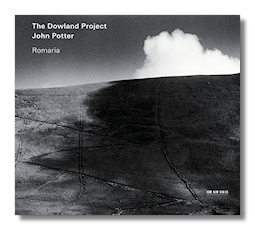
The Internet's Premier Classical Music Source
Related Links
-
Josquin Reviews
Lassus Reviews - Latest Reviews
- More Reviews
-
By Composer
-
Collections
DVD & Blu-ray
Books
Concert Reviews
Articles/Interviews
Software
Audio
Search Amazon
Recommended Links
Site News
 CD Review
CD Review
Romaria

Love Songs, Chants, and Motets from the 12th Century to the Present
- Friminus Caron: Kyrie Jesus autem transiens
- Hans Neusidler: Ein gut Preambel
- Josquin Desprez:
- In flagellis
- Sanctus Tu solus qui facis
- Orlando di Lasso: Credo Laudate dominum
- Oswald von Wolkenstein: Der oben swebt
- Valent/Surman/Stubbs:
- Ein iberisch Postambel
- Saudade
- Anonymous:
- Dulce solum
- Got schepfer
- La lume
- O beata infantia
- O Rosa
- Ora pro nobis
- Pulcherrima rosa
- Veris dulcis
The Dowland Project/John Potter
ECM New Series 1970 (4765780) DDD 77:03
The Dowland Project dates from the late 1990s, when ECM producer Manfred Eicher suggested that tenor John Potter (then a member of the Hilliard Ensemble) record a CD of songs by 16th-century composer John Dowland. Eicher proposed, instead of a traditional lute accompaniment, that Potter should be joined by a consort that some critics might have considered very "broken" indeed, as it included a bass clarinet (doubling on soprano saxophone!) and a double bass, as well as baroque violin and lute. Furthermore, the musicians were encouraged to take an improvisational approach to the material during the recording sessions. To quote Potter, "This [was] the first time anyone's approached Dowland not from an 'early music' angle, but simply as music."
Since In Darkness Let Me Dwell, there has been a second Dowland Project CD (Care-Charming Sleep), and now a third one, reviewed here. Potter is joined by Stephen Stubbs (baroque guitar and vihuela), Milos Valent (violin and viola), and John Surman (bass clarinet, soprano saxophone, and tenor and bass recorders). (Only Surman and Stubbs have participated in all three Dowland Project recordings.) "Romaria" was chosen as its title because it contains the word "aria," and also because the name refers to peregrinations. (The album begins with music whose origin is German, and ends with "Ein iberisch Postambel," a reference to Spain and Portugal.)
The subtitle is "Love songs, chants, and motets from the 12th century to the present," and so there's quite a mix of music here, from Gregorian chants and excerpts from the original Carmina Burana manuscript, to mass movements by Josquin and Lassus, and two original cuts by Valent, Surman, and Stubbs. In essence, Potter sings the tune, and the instrumentalists embroider around it. In the mass movements, which are polyphonic (as opposed to most of the original material on this CD), the instrumentalists take the other parts, although even here the approach is not always straightforward. Compared to Romaria, In Darkness Let Me Dwell now sounds relatively rigid. I think that the material used on the present CD lends itself better to this kind of free treatment. Even though it is almost relentlessly slow and dreamy, there's enough variation of style and texture in Romaria to keep the music from becoming boring. This is most definitely a late-night album, though – not something to play as you're negotiating rush-hour traffic!
As befits a former Hilliard, Potter's singing is lucid and penetrating. I don't always find the soprano sax to be a particularly attractive instrument, but Surman tones down its less appealing qualities, and his bass recorder produces some amazing sonorities. Stubbs is as eloquent as always, and Valent's strings add the right unearthly note. Recorded in Propstei St. Gerold, a favorite Eicher venue in Austria, Romaria also is blessed with evocatively atmospheric sonics.
Copyright © 2008 by Raymond Tuttle




















